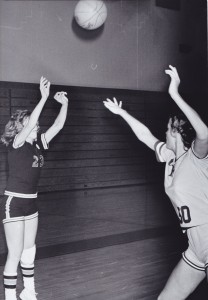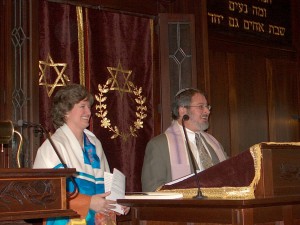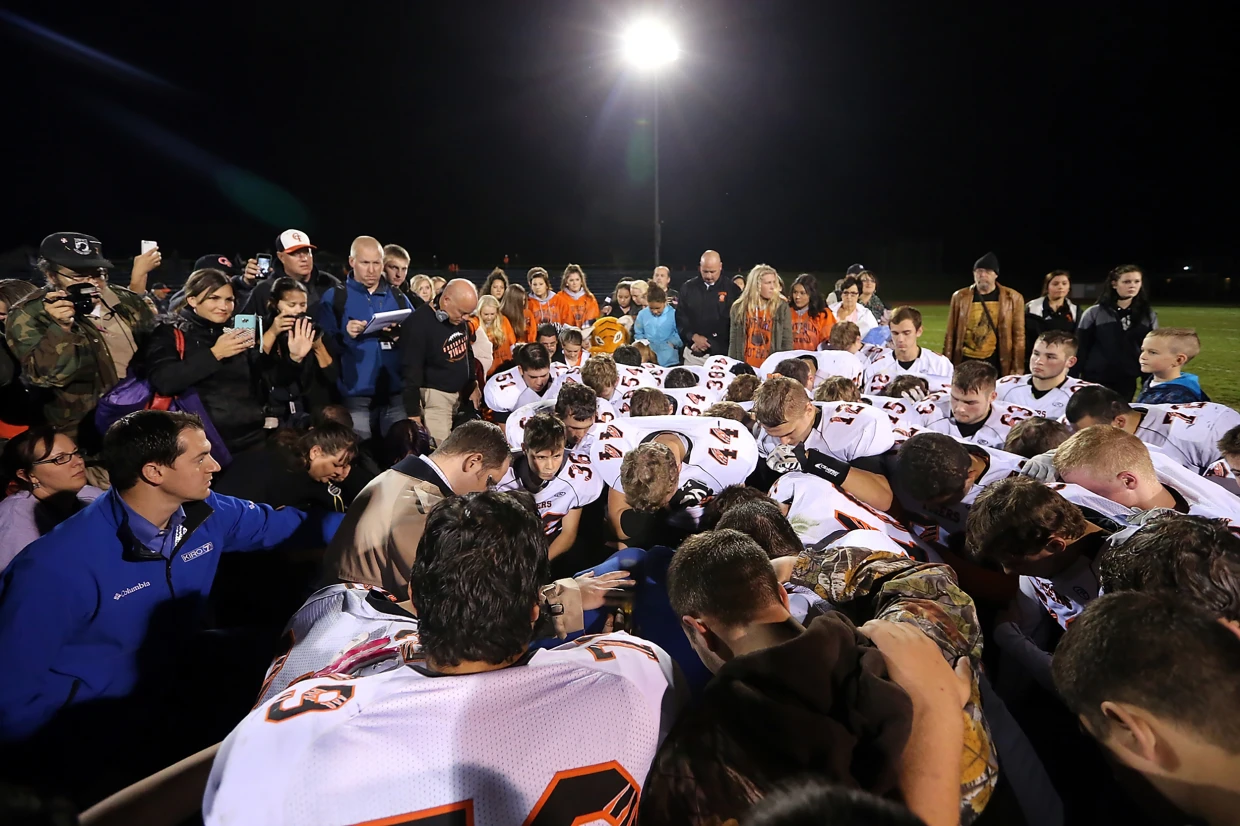Why write? This is part two of my answer to that question.
I wanted a way to push out the feelings that sometimes overwhelmed me from fourth to 12th grade in that rural Ohio school system. I played on the high basketball team and ran track. I acted in school plays. But it was never enough. I felt like the odd one out. I was still the Jew.

I, #23, go for our shot at a high school basketball game. (Photo copyrighted by The Courier, Findlay, Ohio)
Basketball gave me a physical outlet. Music gave some peace, but not enough. So I wrote. I wrote in my diary. I wrote editorials that praised the obvious – like the merits of being grateful at Thanksgiving – for my high school paper. I did not in those days turn inward with my writing. I was more interested in observing and exploring the lives of other people.
During my senior year of high school, I wrote for two daily newspapers in Findlay and Fostoria, Ohio. I wrote about foreign students visiting a zoo, about tax increases, and school board battles. I wrote obituaries. I drove a van to the local hospital to pick up birth reports and to the fire station to pick up the day’s fire calls then typed them up. Sometimes, I wrote meatier stories about others’ struggles with huge life issues like alcoholism and domestic abuse. My high school English teacher tacked one of my first major feature articles to the bulletin board. Peers congratulated me. I had another title: writer. Tossing aside my dream of becoming a solo flutist – a pipe dream, considering the competition — I chose journalism.
For 20-plus years, after high school and college, I worked as a full-time newspaper reporter and editor. In Rochester, NY, where I wrote for The Democrat and Chronicle, stories about a high school teacher and his eighth-period chemistry class in an inner-city high school prompted readers to comment that they now understood why there was no simple fix for urban education’s woes. In Florida, where I reported for The Orlando Sentinel, I dug up $20 million worth of problems with modular classroom buildings that led to mold and collapsing floors. The school buildings got fixed.
At The Dallas Morning News, readers filled the editorial page with letters in response to my narrative series about a college freshman’s financial, social, and academic struggles; the young woman, whose mother was on welfare, had been near the top of her class in the city’s worst high school. Her story highlighted the lack of college readiness among students in the city school system, and yet also inspired a mother to write me that she made her teen-aged daughter read every word. The mother was moved by my subject’s determination not to quit and determined that her own child would try college.
By intention, my last full-time job was at The Boston Globe, where I worked primarily as education editor coaching other writers. Journalism was an enticing and exciting profession. The rewards were often tangible: Write something one day and get a flurry of response – and perhaps even action – the next. But I wanted something more as a writer. In the spring of 2009, I took a buyout from the Globe. Leaving journalism gave me the chance to try to become the writer of my long-ago imaginings, a writer who might someday create words as lyrical as music. It also gave me the chance to stay at home with my first – and only child, Simon, who’s now 2.
In the past, when I wrote, a paycheck and byline were guaranteed. Now, there is no guarantee of regular publication or money, and even finding time to write is a challenge. By choice, I juggle caring for my toddler with writing. With no daily deadline and no singular boss except myself, I take more risks.
I am finally finishing a book I began in 1995 when I was working 40-plus hours a week as a newspaper reporter — a memoir about journeying through grief and getting closer to my Jewish faith. Before I finished college, my middle brother Kevin died in a car accident. The brother who had shared so many of the hard times with me in Ohio was dead at age 23; I was then 21. I wrote nothing publicly about my loss until nine years later. Shortly after I started writing the book, the Orlando paper ran an excerpt in its Sunday magazine, “Eulogy for Kevin, A final tribute to a brother – and a best friend.” I finished a draft of the book five years later – in 2000 – then set it aside. The first stab at the book was a catharsis – that chance to get the grief and the facts down about a deeply personal loss. Something – perhaps the element of universality that publishers crave – was missing. I decided just to let life continue.
In search of a way to fill the hole in my gut from my brother’s death, I became more drawn to Judaism. In 2006, at age 41, I celebrated my adult bat mitzvah – and chanted from the Torah for the first time. Faith and grief in my life became forever linked. The passage I chanted was about how Judaism establishes a circle of mourners obligated to mark the rituals for mourning, including observing a seven-day period of mourning called shiva. I observed none of the Jewish mourning rituals after my brother’s death, but this passage was an awakening. A sibling, according to my faith, deserved the same place in the circle of mourners as someone who lost a child, a spouse, or a parent. I realized that my book was not just about a young woman who lost her big brother. It was a story about loss, faith, and the community we need to foster in our lives so we do not have to weather tragedy – or experience life’s great joys – alone. Faith became a part of my memoir. So did music. So did those experiences in rural Ohio.
No longer working full-time in a newsroom, I became a bolder, more passionate writer. I found the voice that was often silent during my childhood. I became braver about sharing my work with other writers and seeking regular feedback from a growing group of writers whose opinion I value. Daily, I am more alone than I have ever been while writing – and yet when I need it, I have the richest company around.
Less than a month after I left the Globe, in late spring 2009, I spent two weeks alone at novelist Jacquelyn Mitchard’s Cape Cod retreat for writers. I finished a major draft of my memoir. The solitude and the time by the sea helped me make the leap from journalist to freelance writer and budding author. During those weeks, I added something to my book, four essays I call a Concerto of Words. Those pieces were the music I knew I could never compose for my flute.
I want someday to see my name on the cover of a book, but fame is not my motivator. Hope is. There is hope that someday something I write will touch countless readers’ hearts.
For the first time in my life, I experience regular rejection as a writer. My byline – by choice – is no longer a regular presence in one publication as I aim for literary journals and magazines. Some magazines have said yes to queries and essays, but many have said no. Rejection hurts, and yet it does not matter as much as I thought. I am writing what I want to write. This is the happiest I have ever been as a writer.
This is part two of two of my blog series on Why I Write. For part one, read yesterday’s post.
Now, it’s your turn. Why do you write? Use the comment section to reply.





